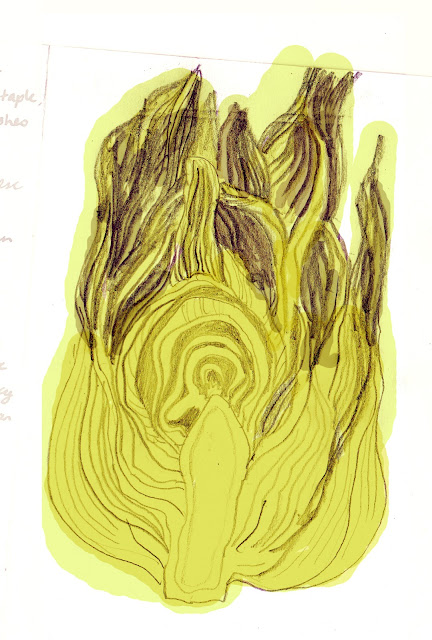Chilli Bean Sauce辣豆瓣酱– . One form of fermented bean paste mixed with chillies to create a very savoury,slightly spicy sauce for stir fries. It is used in a lot of Sichuanese
cookery.
I did use the Lee Kum Kee brand, however I've since found out the additives in the ingredients may come from animal ingredients, so I've swapped for a korean chilli bean paste (e.g. left).
Pickled Mustard Greens –酸菜Suān Cài.
A pickled vegetable popular in
south east Asian cuisine.
It adds a sour, slightly sweet,
crunchy element to dishes.
It can be found in vacuum packs on
the shelves of Chinese supermarkets. Choose ones without food colouring and sweeteners.
I use it in stir fries in a slightly sweet, spicy sauce with
I use it in stir fries in a slightly sweet, spicy sauce with
a mock meat or fried tofu.
Sichuan peppercorns, 花椒Huājiāo
a citrusy pepper that is used for its “numbing” spicy qualities in
Sichuan
cookery. It is available in the supermarket but cheaper in Asian grocers,
look for a deep pinky red colour. If they are brown they are old.
These dried shiitake
mushrooms give a deep flavour to soups, or stirfries and have a
very meaty texture which is great for dumplings.
Soak for at least 20
minutes or a few hours before use. If using in soup, I give them a good rinse then put them in, so the mushroom flavour goes straight into the soup rather than the soaking liquid.
The “flower” type is
preferable; this is a light patterned look on the back of the mushroom as opposed to
just a smooth uniform brown.
Choose mushrooms that
look white at the gills and surface. If the mushrooms gills
are yellow/ orangey brown the mushrooms are not
as fresh. When I cook I chose the browner mushrooms in the pack and use them up first.
A note on “Umami”
Umami means
“deliciousness”. It is one of the basic tastes and one where vegan food can
sometimes fall down if we aren’t aware of this. Meat, eggs, dairy naturally are
high in glutamate, which produces that savoury “umami” flavour. There are
non-animal foods that contain high levels of glutamate too, e.g. tomatoes, mushrooms,
Chinese cabbage, seaweed, potatoes, yeast. Fermented products contain a high
level of glutamates, e.g. soy sauce, the fermented bean pastes like chilli bean
paste, black beans, miso, fermented bean curd, etc., and these are used a lot
in Chinese food.
If you are
experimenting with things, try using soy sauce instead of salt, this ups the
savoury flavour of dishes. Or I will put in things I know have the umami taste,
e.g. dried shitake mushrooms, tomato paste or miso, if I know they would fit
well with the dish. Sometimes when something I am cooking, like a thai curry
has all the elements, salty, sour, sweet, bitter, hot but still seems to lack
something, I will add ¼ cup of nutritional yeast, just to give it that savoury
flavour.



No comments:
Post a Comment